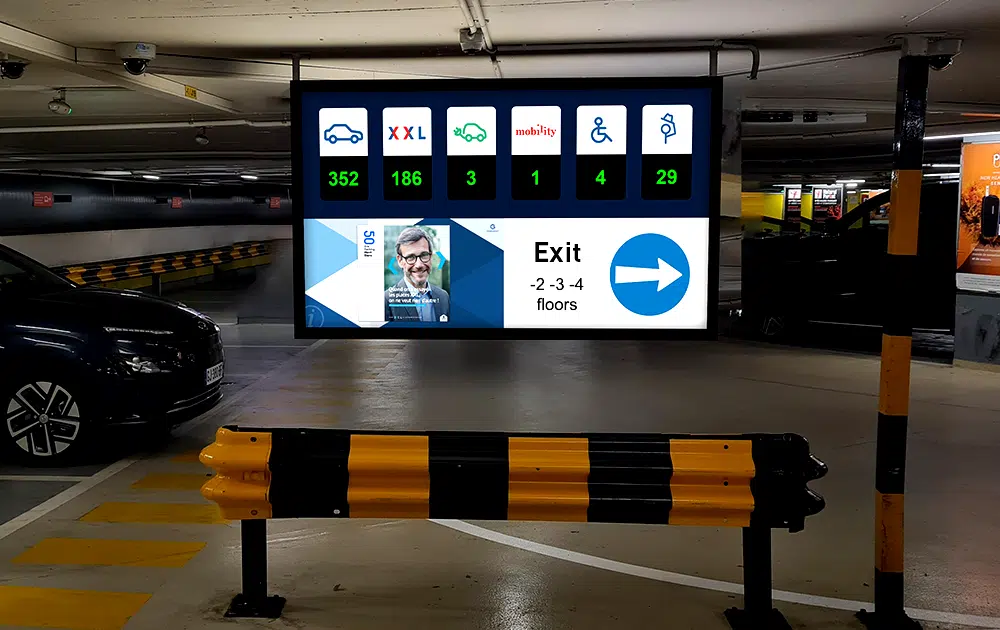In today’s dynamic urban landscape, efficient parking management systems have become indispensable tools for municipalities, businesses, and property owners alike. As cities grow denser and the number of vehicles on the roads continues to rise, the need for effective solutions to manage parking spaces has become more pressing than ever before. Enter the Parking Management System – a comprehensive approach to optimizing parking operations, enhancing user experience, and maximizing revenue potential.
What Is A Parking Management System?
A Parking Management System (PMS) refers to any kind of system that helps individuals, companies and organizations to efficiently oversee and regulate their parking facilities. It has the capability to incorporate a range of cutting-edge technologies, including RFID (Radio-Frequency Identification) and LPR (License Plate Recognition).
These systems leverage a combination of hardware and software components to automate various aspects of parking, including space allocation, payment processing, parking access, data analysis and enforcement. By utilizing advanced sensors, cameras, mobile applications, and much more, Parking Management Systems offer a seamless and user-friendly experience for both operators and drivers.
Key Components of Parking Management Systems
1. Entry and Exit Control
It includes barriers, gates, and entry/exit terminals outfitted with ticket dispensers, card readers, RFID systems, or LPR Technology, all tailored to control access to the parking facility.
2. Payment Collection
Integrated payment solutions streamline the process of collecting parking fees, offering users convenient payment options such as kiosks, mobile applications, and online platforms. These systems ensure secure transactions while maximizing revenue for parking operators.
3. Parking Guidance System
Utilizing sensors and dynamic signage, a parking guidance system assists drivers in locating available parking spaces quickly and efficiently. By reducing search time and congestion, it enhances the overall parking experience and improves utilization of parking assets.
4. Security Monitoring
Integrated surveillance cameras provide continuous monitoring of parking facilities, preventing unauthorized activities and enhancing safety for both vehicles and users. Real-time alerts and video analytics enable prompt responses to security incidents.
5. Data Management
Parking management systems capture and analyze vast amounts of data related to parking occupancy, revenue generation, and user behavior. Robust reporting tools offer valuable insights for decision-making, allowing operators to optimize resource allocation, implement dynamic pricing strategies, and enhance overall performance.
6. Digital Signage
Digital signage solutions provided by System TV offer dynamic and informative displays throughout parking facilities. These digital parking signs not only provide real-time updates on parking availability but also deliver relevant announcements, promotions, dynamic pricing, and directions to enhance user experience and engagement.
By leveraging digital signage, parking operators can effectively communicate with drivers, optimize traffic flow, create a more engaging environment within the parking facility and increase their revenues.

Benefits of Implementing a Parking Management System
1. Optimized Space Utilization
Parking Management Systems revolutionize parking dynamics by leveraging cutting-edge technology to maximize space utilization. By offering real-time information on parking space availability, drivers can swiftly locate vacant spots without aimless circling, thereby minimizing congestion within parking areas.
Additionally, PMS employ sophisticated algorithms to minimize instances of underutilized spaces, ensuring every available spot is optimally utilized. This strategic approach not only enhances efficiency but also contributes to a more sustainable urban environment by reducing the need for additional parking infrastructure.
2. Improved User Experience
Parking management systems prioritize user satisfaction by integrating features that enhance the overall parking experience. With parking guidance systems directing drivers to available spots, the frustration of searching for parking is significantly reduced.
Mobile payment options and digital permits offer convenience and flexibility, eliminating the hassle of traditional payment methods. These user-centric features enhance accessibility and convenience, leading to heightened satisfaction levels among drivers and fostering positive perceptions of parking facilities.
3. Increased Revenue Generation
Parking Management Systems represent a lucrative opportunity for revenue generation by streamlining operations and introducing innovative pricing strategies. Automation reduces manual interventions, cutting operational costs and increasing efficiency.
Dynamic pricing mechanisms allow operators to adjust rates based on demand, maximizing revenue potential during peak periods. Furthermore, data-driven insights provided by PMS enable operators to identify revenue optimization opportunities and capitalize on them effectively. This approach not only enhances financial performance but also ensures the long-term sustainability of parking assets.
4. Enhanced Traffic Flow
Efficient parking management reduces congestion in and around parking facilities, leading to smoother traffic flow, reduced emissions, and a more sustainable urban environment.
The Future of Parking Management Systems
As technology continues to evolve, so too will the capabilities of Parking Management Systems. Advancements in artificial intelligence, IoT sensors, and predictive analytics promise to further enhance the efficiency and effectiveness of parking operations.
Furthermore, the integration of solutions such as EV charging, along with alignment with smart city initiatives and transportation networks, will facilitate seamless and environmentally conscious mobility experiences for parking users.
In conclusion, Parking Management Systems represent a vital tool for addressing the challenges faced by parking facilities. By leveraging innovative technologies and strategic approaches, these systems offer tangible benefits for both operators and users, paving the way for a more sustainable and efficient future for the parking industry



